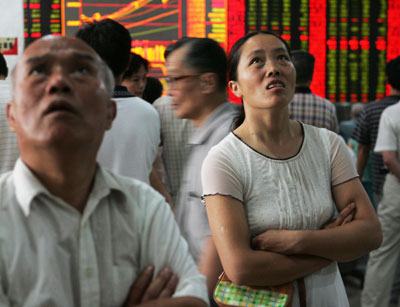China shares sink on policy fear, Sinopec
(Reuters)Updated: 2007-06-26 09:02
 Investors monitor the movement of stock prices at a brokerage firm in Wuhan, Central China's Hubei Province June 25, 2007. [newsphoto] |
China's main stock index plunged 3.68 percent on Monday, hit by worries about government policies to cool the economy and market, and by big losses in oil refining giant Sinopec after its chairman resigned.
The Shanghai Composite Index closed at 3,941.081 points, its first drop below 4,000 points since June 12, after sinking as much as 4.38 percent at one stage. On Friday, it tumbled 3.29 percent.
Losing Shanghai stocks overwhelmed gainers by 792 to 73, while 270 plunged their daily limits of 10 percent.
Turnover in Shanghai A shares shrank to 139.2 billion yuan ($18.3 billion) -- the smallest since early April -- from Friday's 165.5 billion yuan. That suggested many buyers had pulled out of the market, traders said.
"Investor sentiment is changing now. People are more cautious, especially since the government has hinted at raising interest rates recently and new IPOs are being announced," said Guo Yanling, analyst at Shanghai Secruties.
Sinopec Corp. , the second most heavily weighted stock in the index, plunged 5.74 percent to 13.47 yuan after it announced chairman Chen Tonghai had resigned for "personal reasons", two years before he was due to retire.
Analysts said it was unclear whether Chen's resignation might have any material impact on a large company like Sinopec. But some, including Goldman Sachs, said the abrupt departure could hurt the stock in the short term.
Stocks in general were dampened by concern about stronger official action to cool the market.
Central bank governor Zhou Xiaochuan, speaking in Switzerland at the weekend, said authorities were "not sure" if there was a bubble in stocks. This was a slightly more benign comment than his remarks in May, when he said the market was in a bubble.
But Zhou also said the central bank was watching stock prices closely, and that another interest rate hike could not be ruled out because inflation might rise "a little bit" further.
In addition to the interest rate threat, big Shanghai IPO plans revealed by top Chinese companies in the past ten days are seen as an attempt by authorities to cool the market through greater supply of shares.
Parliament is expected to consider this week a plan for the Ministry of Finance to issue as much as $200 billion of yuan bonds domestically to fund purchases of foreign reserves for a new overseas investment agency.
The timing and method of the bond sales remain unclear, and they will not necessarily mean less liquidity in the markets if the central bank compensates for them by cutting bill issues.
But huges amounts of excess money sloshing around the markets have helped sustain China's equities bull run, so the possibility of much of this money being taken away is worrying investors.
Official data showed the number of new A-share investment accounts being opened daily slipped to a two-month low of 160,104 on Thursday. That was still well above last year's levels, but suggested the amount of new money pouring in to stocks from individual investors might decrease.
The index has twice pulled back sharply from 4,335 points, where it hit an all-time high in May. Many traders believe it may consolidate for some weeks or months between 4,335 and the June low of 3,404.
Among Monday's gainers, China Life continued this month's strong rally, climbing 2.51 percent to 44.53 yuan on the belief that an interest rate hike would help the company boost its investment returns. It has surged from an early June intra-day low of 32.10 yuan.
Many banks also resisted the market's fall, with Merchants Bank up 3.27 percent to 24.96 yuan.
Machinery makers were relatively strong with Sany jumping 8.21 percent to 46.14 yuan, hitting a record high. ($1 = 7.62 yuan)
|
||
|
||
|
|